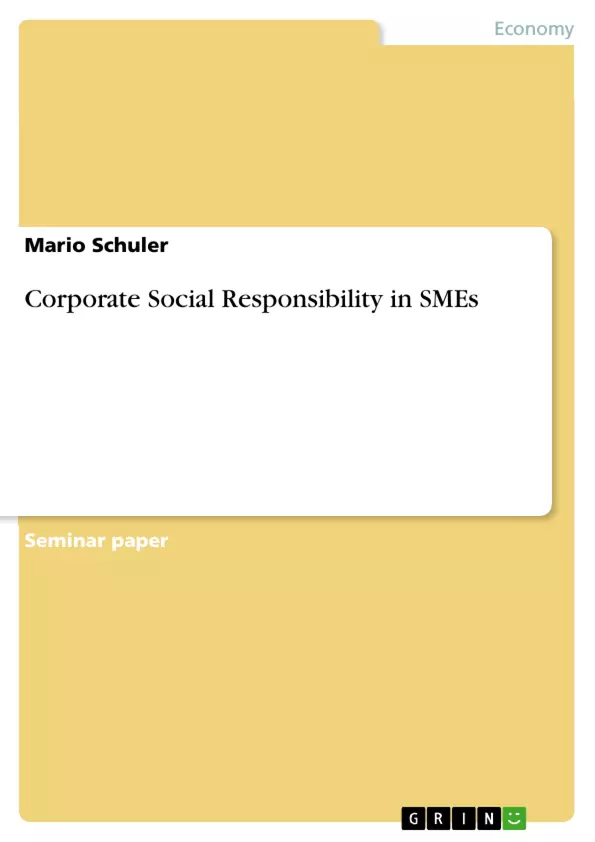Abstract: This paper provides an overview of the contemporary debate on the concepts and definitions of Corporate Social Responsibility (CSR) with a special focus on small and medium-sized enterprises (SMEs). Conclusions are based on historical perspectives as well as surveys showing why there are still huge divergences whether to implement a proper concept of CSR in SMEs or not. In contrast to multi-national companies (MNCs), which not uncommonly abuse this vogue word, many SMEs struggle to establish an appropriate CSR strategy. This paper will provide an overview of the merits and drawbacks of this highly controversial and elastic term CSR and suggest solution approaches for SMEs in order to stay competitive.
Inhaltsverzeichnis (Table of Contents)
- 1. Introduction
- 2. Corporate Social Responsibility (CSR)
- 2.1 Definition, Origins and Approaches of CSR
- 2.2 Components of CSR
- 2.3 Impacts of CSR
- 2.4 Tendencies in CSR
Zielsetzung und Themenschwerpunkte (Objectives and Key Themes)
This paper examines the concept of Corporate Social Responsibility (CSR) within the context of small and medium-sized enterprises (SMEs). The paper aims to provide a comprehensive understanding of CSR, its historical development, and its practical implementation in SMEs. This includes exploring the advantages and disadvantages of CSR, as well as identifying potential challenges and solutions for its successful integration into SME operations. The paper's goal is to ultimately assess the value of CSR for SMEs in today's competitive business environment.
- Definition and historical evolution of CSR
- Key components and impacts of CSR
- Challenges and opportunities of implementing CSR in SMEs
- The role of CSR in promoting sustainable and ethical business practices
- The potential benefits of CSR for SME competitiveness and long-term success
Zusammenfassung der Kapitel (Chapter Summaries)
The paper begins by introducing the significance of SMEs in the global economy and outlining the emergence of CSR as a means to enhance business efficiency. Chapter 2 delves into the concept of CSR, exploring its definition, origins, and various approaches. It examines the main components of CSR, highlighting the diverse perspectives of different authors and the influence of cultural and educational backgrounds on its implementation. The chapter concludes by analyzing the impacts of CSR on different aspects of business operations and the potential for creating a "win-win" situation for both companies and society.
Schlüsselwörter (Keywords)
The central focus of this paper is Corporate Social Responsibility (CSR) and its application within small and medium-sized enterprises (SMEs). The paper explores various aspects of CSR, including its definition, components, historical development, and practical implications for SMEs. The key concepts discussed include stakeholder issues, ethical and social responsibility, environmental sustainability, and the impact of CSR on business performance and competitiveness.
Frequently Asked Questions
What is the focus of Corporate Social Responsibility (CSR) in SMEs?
The paper focuses on how small and medium-sized enterprises (SMEs) can implement CSR strategies to stay competitive, despite having fewer resources than large corporations.
Why do SMEs struggle with CSR compared to multinational companies (MNCs)?
SMEs often lack the formal structures and budgets of MNCs, making it harder to establish and communicate a proper CSR concept.
What are the potential benefits of CSR for small businesses?
CSR can enhance business efficiency, promote sustainable ethical practices, and improve long-term competitiveness and success.
What are the main components of CSR discussed?
The key components include stakeholder management, environmental sustainability, social responsibility, and ethical business conduct.
Does CSR lead to a "win-win" situation?
Yes, the paper analyzes how CSR can benefit both the company (through performance) and society (through social and environmental contributions).
- Citation du texte
- Mario Schuler (Auteur), 2012, Corporate Social Responsibility in SMEs, Munich, GRIN Verlag, https://www.grin.com/document/206267



